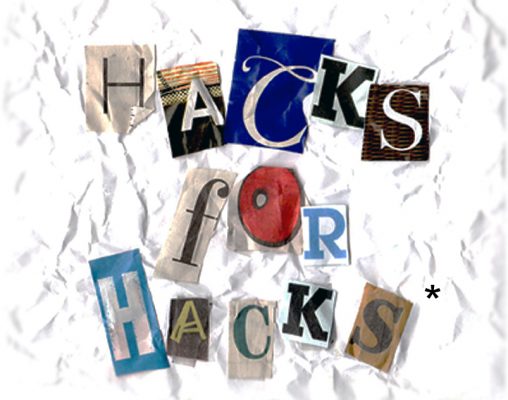So Your Feedback Session is Spiraling Out of Control
By Bill Ferris | February 15, 2020 |

Warning: Hacks for Hacks tips may have harmful side effects on your writing career, and should not be used by minors, adults, writers, poets, scribes, scriveners, journalists, or anybody.
You thought your story was ready to go. Sure, you ostensibly shared your story with your writing group so they could critique it, but on the other hand, shouldn’t they have recognized that their quote-unquote “feedback” would screw up your victory lap? How dare they slander your manuscript! Unrealistic characters? Boring exposition? Undecipherable symbolism? Yes, you may have written some elitist nonsense, but it was even MORE elitist of them to point that out!
For writers, these miscarriages of literary justice are as excruciating as they are universal. Like getting a vaccination, you should remind yourself that the pain you’re experiencing is fleeting, but ultimately it will make you stronger, and make you less likely to repeat the same mistakes in future works—mistakes like run-on sentences, infodumping, and not vetting members of your writing group more carefully.
So take a deep breath and gird your loins because I’m going to show you how to cope with a disaster feedback session.
Don’t argue.
Every reader is allowed to have their own opinion (check your writers group guidelines just to be sure, however). If a reader doesn’t like your story, that doesn’t make them wrong, it only makes them incorrect. When your story gets published, you can’t go to each reader’s house and explain things to them every time they misunderstand a plot point, so why would you think it’s a good idea to do so with your writing group? It’s a much better use of your time to nurse your grudge and shame them on social media when you finally sell your story to a publisher.
Show them respect (with emphasis on “show”).
Your beta readers took the time to read your story and offer their thoughts, and you can best show your appreciation by giving them your full attention, performatively if possible. Take copious notes of their comments, writing stern rebuttals to each as you smile and nod. Focus on keeping your fingers moving to distract you from the emotional distress of their horrific misreading of your work. If you have a laptop with a loud keyboard, your clackety note-taking may be able to drown out their nonsense.
Ask clarifying questions.
To get the most out of feedback, make sure that you fully understand it. Asking questions about reviewers’ comments can lend new insight to your story, as well as diffuse a tense situation by demonstrating that you take their input seriously. Wait until they’ve had their say, then follow up about any feedback you didn’t quite understand. For example:
- “You mentioned you didn’t understand Stella’s motivation in this scene; did her actions in the opening scene set unmet expectations?”
- “I actually explain why Rupert is wearing white after Labor Day (because he’s on a submarine). Did you skip that scene, or were you just not paying attention?”
- “You mentioned that you think Stella’s personal stakes are too low. Are you freaking kidding me?”
You’ll be surprised at how much better you feel after asking reviewers to clarify exactly why they missed the point. If this seems like arguing, consider that no, it’s not.
Tough feedback sessions are never fun, but they’re less painful if you use these tools for getting through it. And once you make them part of your regular repertoire, comments like “This story didn’t work for me” transform into “Oh, um…yeah, it’s a fun piece,” or even better, “Yeah, sorry, I’m just too busy to read it right now.”
How do you get through a rough feedback session? Share your strategies in the comments!
[coffee]










Hahaha. Humor makes the medicine go down. As does a stiff drink. Love this post.
Whoa – where has THIS nugget of passive-aggressive genius been all my life?
“You’ll be surprised at how much better you feel after asking reviewers to clarify exactly why they missed the point. If this seems like arguing, consider that no, it’s not.”
You are my new life coach.
I cope by bursting into tears which is quite effective. You might try it. Usually the person delivering the feedback suddenly changes their tune and tells me all the great things about my work instead of the nugget they’re pointing out (that they clearly didn’t get). That’s what happens when you write high art. The plebeians just don’t get it. ;D
I look forward to your posts, Bill. I don’t often comment, but when they arrive in my inbox on Saturday morning, I relish the laugh with my coffee before I dive into the WIP. Cheers
Aha! As I had always suspected – crying as a tactic. A trade secret revealed. Brilliant. Playing a deeper game, check and mate!
I’m taking all the notes to use at our group this Tuesday. *Scribbles furiously*
Set up guidelines for the group for giving feedback. Suggest, if it doesn’t come up from members’ ideas, that they have to say something positive first; followed by a constructive piece of criticism; followed by a ‘how to’ for achieving the suggestion. This puts the onus on the critiquers, and you’ll be surprised at how the group begins to relax and to give honest but really helpful feedback. They will start to feel comfortable and trusting one another in the group. If it doesn’t work, egos are driving the group and you may as well give up.